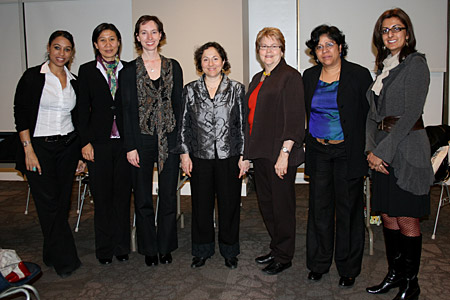A Vote for CEDAW is a Vote for Women
Last week, in honor of International Women's Day, the ACLU hosted a roundtable discussion at the 54th Session of the United Nations Commission on the Status of Women on the importance of the Convention on the Elimination of All Forms of Discrimination Against Women (CEDAW) and the great need for the United States to ratify the global treaty. The U.S. is one of only seven countries that has yet to ratify CEDAW, and of those, is the only industrialized democracy. CEDAW celebrated its 30th anniversary in December — it's time for the U.S. to join the rest of the world in ratifying this crucial treaty, which our government was instrumental in drafting.

Please note that by playing this clip You Tube and Google will place a long-term cookie on your computer. Please see You Tube's privacy statement on their website and Google's privacy statement on theirs to learn more. To view the ACLU's privacy statement, click here.
American women can benefit from CEDAW in a plethora of ways. Contrary to some misconceptions, gender discrimination and human rights abuses occur right here at home, not only in other countries. CEDAW is a holistic treaty that would encourage improvements for women in economics, healthcare, employment, education, and gender-based violence, to name a few. For example, Radhika Balakrishnan, from the U.S. Human Rights Network, explained that CEDAW would ensure that macroeconomic policies, including the government stimulus plan and decisions about spending cuts, build in consideration for the unique concerns of women. Gouri Sadhwani, from Amnesty International USA, gave the example of maternal mortality rates: every day three to four women die during childbirth in the U.S. This is not because we don't know how to stop women from dying, it's because we lack the political will to put the necessary resources into making sure that women don't die during childbirth. CEDAW contains specific guidelines and guarantees that would push the government to address this issue.

Panelists, from left to right: Karen Richardson, Zarizana Abdul Aziz, Karen Stefiszyn, Lenora Lapidus, Charlotte Bunch, Radhika Balakrishnan, Gouri Sadhwani
Zarizana Abdul Aziz, a Malaysian women's rights activist, and Karen Stefiszyn, from the United Nations Development Fund for Women, gave concrete examples of how CEDAW has produced positive results in other countries, such as legal reform in the arenas of inheritance, divorce and violence against women in countries like Kenya, Sierra Leone, and Malaysia. By holding each nation, government, and people accountable to international standards of human rights, CEDAW is instigating positive changes for women all over the world. It is an international tool with specific steps to better our world. Charlotte Bunch, from the Center for Women's Global Leadership, emphasized that, by not ratifying CEDAW, the U.S. places itself in collusion with the other nations who have not ratified CEDAW: Iran, Sudan, Somalia, Palau, Nauru, and Tonga. She noted that CEDAW has the potential to foster international dialogue and cooperation around improving women's lives, helping us all learn about good practices, new approaches and solutions to women's issues.
Karen Richardson, from the Office of the Ambassador-at-Large for Global Women's Issues in the State Department, expressed the Obama administration's commitment to women and to getting CEDAW ratified, saying that, "You really have the strongest advocates in Ambassador [Melanne] Verveer and Secretary Clinton." The panelists agreed that there is a unique political opportunity right now, in this mid-term election year, to get the 67 votes in the Senate needed to ratify CEDAW. Lenora Lapidus, from the ACLU, invited individuals and organizations to join the CEDAW Task Force, created by the Leadership Conference on Civil and Human Rights, which is leading the effort to get CEDAW ratified.
Check out video clips and a photo slideshow from the event, watch footage of the entire roundtable discussion on YouTube, and stay tuned for more ways that you can get involved.
— Stephanie Bloom and Selene Kaye
Stay informed
Sign up to be the first to hear about how to take action.
By completing this form, I agree to receive occasional emails per the terms of the ACLU's privacy statement.
By completing this form, I agree to receive occasional emails per the terms of the ACLU's privacy statement.


